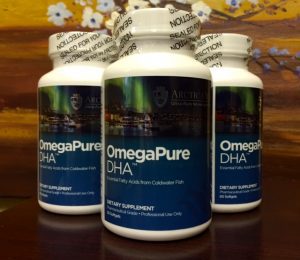Understanding Essential Fatty Acid Supplements for Brain Health
With new products, studies, and conflicting information congesting the internet, the world of supplements can quickly become overwhelming. The following information will help provide specific guidelines and information around using fatty acid supplementation for improving brain health, and helping people recover from concussions and traumatic brain injuries.
Essential fatty acids (EFA’s) are called “essential” because the body cannot produce them, and therefore they need to be consumed through the diet. Omega3’s, 6’s and 9’s, each have different functions in the body with omega 3’s being the most important for brain health. The brain is 60% fat, and 90% of this fat is made of the omega 3 fatty acid DHA (not to be confused with DHEA the steroid hormone).
The ideal ratio of Omega 3 to omega 6 is 1:1, however, with the standard American Diet and large consumption of vegetable oils, many people are consuming ratios of 1:10 or even 1:25. For this reason, regarding brain health, supplementing with Omega 6’s and 9’s is usually unnecessary unless someone has been on a very low-fat diet for an extended period of time, and is deficient in healthy fats overall. So, spending money on an “Omega 3-6-9 EFA” could be better spent on a high potency DHA.
Omega 3’s
EPA and DHA are both omega 3 essential fatty acids found in fish oil. EPA helps modulate inflammatory pathways throughout the body, useful for joint pain, musculoskeletal inflammation, or other inflammatory conditions. DHA is an essential component of nerve membranes. Adequate amounts of DHA are necessary for overall brain health and cognitive function. DHA plays a role in the regulation of brain-derived neurotrophic factor (BDNF). BDNF promotes new nerve growth, and is needed for repairing and rebuilding neurons in the brain following brain injury. Quite simply, if you want your neurons to fire properly so that you can think, act, speak, run, jump and play until the day you die, you should probably take DHA.
 The Fish du Jour is actually a crustacean…
The Fish du Jour is actually a crustacean…
A lot of the confusion lies not just in understanding the different benefits of EPA vs. DHA, but also in choosing which form of omega 3 supplement is best – krill, cod, tuna, sardines, anchovies? Krill naturally produce a phosphorylated form of EPA and DHA that is easier for the brain to utilize compared to the triglyceride form of EPA and DHA. Krill oil also contains phosphatidylcholine, another extremely important nutrient for the brain. Choline is essential for learning and memory. The hippocampus is a region of the brain responsible for memory formation and spacial learning. If you want to continue to learn new things in life, you need a highly functioning hippocampus. Foods highest in choline are beef liver, chicken liver, and eggs (eat your yolks!). So, for those who don’t eat liver on a regular basis, a choline supplement, such as Krill Oil, is the best substitute.
One more key point – Krill oil contains astaxanthin, a potent anti-oxidant that has been shown to regulate cytokine production. Following concussion, glial cells in the brain release an abundance of pro-inflammatory cytokines. Astaxanthin is one of our weapons against on-going inflammatory processes in the brain that lead to mental fatigue and neurodegeneration. For people recovering from concussions and traumatic brain injuries, I recommend taking Krill oil and and additional high potency DHA. Krill oil is expensive, but so so worth it. Neuroscientist and nutrition expert Dr. Rhonda Patrick, has a great video on why krill oil is an extremely beneficial form of omega 3’s, if you want the ultra-sciencey version.
Quality
When taking a fish oil, it is imperative that it is of high quality. Fish oils are unstable, and can easily become oxidized (krill oil is more stable). Oxidized oils crossing the blood brain barrier can actually create more inflammation and oxidative damage in the brain. The International Fish Oil Standards (IFOS) program is a third party testing program that sets the highest standards for fish oils. They test every batch and lot for:
Radiation
Heavy metals
Oxidation
Other environmental contaminants like PCBs and dioxin
My recommendation would be to only take a fish oil that has been third party tested by IFOS, and choose one with the lowest oxidation rating. Click here for an example of an IFOS report on Xymogen’s OmegaPure EPA/DHA product and note the TOTOX level on page 2. This is the overall level of oxidation, that needs to be below 19.5, Xymogen’s is 2.58.
For people who are recovering from concussions, or dealing with neurodegenerative disorders, greater amounts of DHA should be taken over EPA, unless there are also high levels of inflammation and pain in the body from other injuries, then ratios of DHA to EPA can be closer to 1:1. Recommendations on the amounts of Omega 3’s varies greatly based on who you talk to. Healthy adults can aim for 1000-2,000 mg of omega 3’s per day, adults with brain inflammation, cognitive deficits, depression, and history of concussions need levels closer to 3,000 – 5,000mg/day (some clinicians are recommending even higher doses than that).
If you would like more information on how to obtain high quality and high potency fish and krill oil, e-mail me at amymoll@HRAclinics.com. If you are looking for more targeted support for recovering from concussions, ask me about my concussion recovery health coaching program, available both in-person or via skype.




Brain Health* Excellent article!
Very understandable. Thank You!!